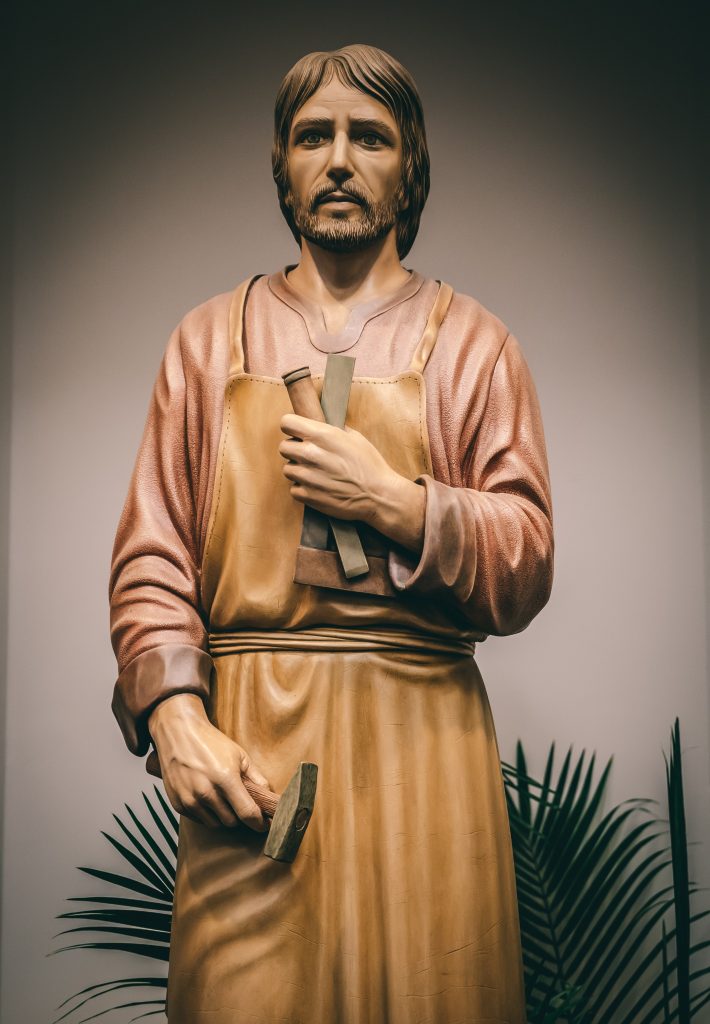Then said Jesus unto his disciples, If any man would come after me, let him deny himself, and take up his cross, and follow me. For whosoever would save his life shall lose it: and whosoever shall lose his life for my sake shall find it. For what shall a man be profited, if he shall gain the whole world, and forfeit his life? or what shall a man give in exchange for his life?
Matthew 16:24-26

There’s a common perception that when it comes to serving God, harder is holier. This is not an entirely surprising perspective because the church celebrates the trials and tribulations of the saints. Not to mention, the Gospel authors make it clear that we should “deny ourselves” and in our hearts, we read that passage and interpret that to mean that Jesus wants us to choose thing that we want to do the least. This is almost heresy when you consider that God, as our Father in Heaven, wants what’s best for us, in accordance to how He has made us to be. What Jesus is referring to in that passage is that when our wills and what we want do not align with the Father’s will and what He wants, then we deny ourselves.
St. Joseph: the holiness in ordinariness
What does it mean to be holy? Being holy means saying “yes” to the Father. It also means saying yes to the personal crosses we encounter in our lives daily as Jesus asks. For someone like St. Joseph, that meant doing the work of a carpenter and raising his son, Our Lord, as an ordinary human boy; though so little is written about him, we celebrated the “Year of Saint Joseph” in 2020 in commemoration of the 150th anniversary of the Church’s Church’s declaration of Saint Joseph as Patron of the Universal Church.

“We are all called to become saints…be a saint by carrying out your work with honesty and competence and by offering time in the service of your brothers and sisters. But, father, I work in a factory; I work as an accountant, only with numbers; you can’t be a saint there…. yes, yes you can! there, where you work, you can become a saint. God gives you the grace to become holy. God communicates himself to you. Always, in every place, one can become a saint, that is, one can open oneself up to this grace, which works inside us and leads us to holiness.”
Pope Francis
St Joseph was an ordinary man on whom God relied on to do great things. In the Gospel of St Matthew, St Joseph was described as a “just man.” The term “just” or “righteous” means right with God. We read an inner monologue of his thoughts and emotional conflict from the minute Mary tells him of her pregnancy but he continues to do exactly what the Lord wants him to do, in each and every event in his life. St. Joseph’s fidelity to his everyday responsibilities as a husband, father, provider, and protector of his family – is synonymous with his life of holiness.

But all the Saints had these hard lives, I’m definitely sure harder is holier…
Again, it will be like a man going on a journey, who called his servants and entrusted his wealth to them. To one he gave five bags of gold, to another two bags, and to another one bag each according to his ability. Then he went on his journey.
The man who had received five bags of gold went at once and put his money to work and gained five bags more. So also, the one with two bags of gold gained two more. But the man who had received one bag went off, dug a hole in the ground and hid his master’s money.
“After a long time the master of those servants returned and settled accounts with them. The man who had received five bags of gold brought the other five. ‘Master,’ he said, ‘you entrusted me with five bags of gold. See, I have gained five more.’ His master replied, ‘Well done, good and faithful servant! You have been faithful with a few things; I will put you in charge of many things. Come and share your master’s happiness!’The man with two bags of gold also came. ‘Master,’ he said, ‘you entrusted me with two bags of gold; see, I have gained two more.’ His master replied, ‘Well done, good and faithful servant! You have been faithful with a few things; I will put you in charge of many things. Come and share your master’s happiness!’
Then the man who had received one bag of gold came. ‘Master,’ he said, ‘I knew that you are a hard man, harvesting where you have not sown and gathering where you have not scattered seed. So I was afraid and went out and hid your gold in the ground. See, here is what belongs to you.’ His master replied, ‘You wicked, lazy servant! So you knew that I harvest where I have not sown and gather where I have not scattered seed? Well then, you should have put my money on deposit with the bankers, so that when I returned I would have received it back with interest.
Matthew 25:14-28
“Each according to his ability”
When our Lord tells us the Parable of the Bags of Gold, he makes certain to mention that the master in the story has given his servants responsibilities “each according to his ability” – one had received five bags, another had received two and the last received only one. Yet, when the master returns, he is not interested in the quantum of the returns but only that his servants had done their best. The master in the parable, a proxy for Jesus, gives equal praise to the servant who has returned five more bags of gold and the one who has returned only two more bags of gold. In our Lord’s eyes, both accomplishments merit equal praise even though the results are quantifiably unequal: “Well done, good and faithful servant! You have been faithful with a few things; I will put you in charge of many things. Come and share your master’s happiness!”
While the first two-thirds of the parable are quite clear in their meaning, many struggle with what happens to the last servant with one bag. In our eyes, he’s a fearful man and he perceives his master as a harsh taskmaster. How many among us will admit that we perceive God as a harsh bean counter who keeps tally of our sins rather than an all merciful, all loving Abba, Father? So, we see and think that the last servant is a proxy for us. However, Jesus gives us quite a few clues, the master had gone on a long journey and so the two servants doubled their holdings had been hard at work and the last servant merely hid his responsibilities in the ground and did nothing for it but offering our Lord a feeble excuse which the master chastises as “wicked and lazy”. Hence, from this passage we can discern that our Lord gives us crosses according to our ability and He is as proud as a Saint’s success with his big crosses (5 bags) as he is of a Saint’s small crosses (2 bags) and all He asks is that you do not set your smallest of crosses (1 bag) aside.

What it actually means to be good and faithful servants
“When the Lord invites us to become saints, he doesn’t call us to something heavy, sad… quite the contrary! it’s an invitation to share in his joy, to live, and to offer with joy every moment of our life, by making it become at the same time a gift of love for the people around us. if we understand this, everything changes and takes on new meaning, a beautiful meaning, a meaning that begins with little everyday things”
Pope Francis, General Audience, November 19, 2014
Man is made to work, not only because it is written in the book of Genesis that he was created to till the earth and care for it, but because it is the way in which God gives us the capacity to transform himself, create new things (just like God does), and also to improve the world. The Catechism of the Catholic Church (no. 2428) teaches that “in work, the person exercises and fulfills in part the potential inscribed in his nature. the primordial value of labor stems from man himself, its author and its beneficiary. Work is for man, not man for work. Everyone should be able to draw from work the means of providing for his life and that of his family, and of serving the human community.”

The sanctification of ordinary work is a living seed, able to yield fruits of holiness in an immense number of souls. When reflecting on St Joseph being a just man, Pope Benedict wrote: “In Joseph, faith is not separated from action. His faith had a decisive effect on his actions. Joseph is a ‘just man’ (Mt 1:19) because his existence is ‘adjusted’ to the word of God.”
St Joseph became the “good and faithful servant” precisely because our Lord’s adoptive father performed his duties as given by God faithfully and to the best of his ability.
